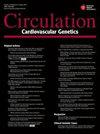Letter by Amin et al Regarding Article, "Genetic Modifiers for the Long-QT Syndrome: How Important Is the Role of Variants in the 3' Untranslated Region of KCNQ1?"
Q Medicine
引用次数: 3
Abstract
In their article, Crotti et al1 aimed to replicate our earlier discovery that single-nucleotide polymorphisms (SNPs) in the 3′ untranslated region (3′UTR) of KCNQ1 can suppress gene expression and thereby alter disease expressivity in patients with type 1 long-QT syndrome (LQT1).2 To do this, they studied the association between 3 3′UTR SNPs and the clinical phenotype in 3 LQT1 founder populations. They found that the 3′UTR SNPs were not associated with QTc or symptoms in these 3 populations. However, when the 3 groups were combined, the derived SNP haplotype located on the mutated allele did associate with shorter QTc and less cardiac events, which is fully in line with our earlier discovery. Despite this clear congruency with our findings, the authors still conclude that they could not replicate our findings. They base this on additional statistical analysis because when they …Amin等人关于文章《长qt综合征的遗传修饰因子:KCNQ1 3'非翻译区变异的作用有多重要?》
在他们的文章中,Crotti等人1旨在重复我们早期的发现,即KCNQ1的3 '非翻译区(3 ' utr)的单核苷酸多态性(snp)可以抑制基因表达,从而改变1型长qt综合征(LQT1)患者的疾病表达为此,他们研究了3个LQT1创始人群中3个3 ' utr snp与临床表型之间的关系。他们发现,在这3个人群中,3 ' utr snp与QTc或症状无关。然而,当3组组合时,位于突变等位基因上的衍生SNP单倍型确实与更短的QTc和更少的心脏事件相关,这与我们早期的发现完全一致。尽管这与我们的发现明显一致,但作者仍然得出结论,他们无法复制我们的发现。他们基于额外的统计分析,因为当他们…
本文章由计算机程序翻译,如有差异,请以英文原文为准。
求助全文
约1分钟内获得全文
求助全文
来源期刊

Circulation-Cardiovascular Genetics
CARDIAC & CARDIOVASCULAR SYSTEMS-GENETICS & HEREDITY
CiteScore
3.95
自引率
0.00%
发文量
0
期刊介绍:
Circulation: Genomic and Precision Medicine considers all types of original research articles, including studies conducted in human subjects, laboratory animals, in vitro, and in silico. Articles may include investigations of: clinical genetics as applied to the diagnosis and management of monogenic or oligogenic cardiovascular disorders; the molecular basis of complex cardiovascular disorders, including genome-wide association studies, exome and genome sequencing-based association studies, coding variant association studies, genetic linkage studies, epigenomics, transcriptomics, proteomics, metabolomics, and metagenomics; integration of electronic health record data or patient-generated data with any of the aforementioned approaches, including phenome-wide association studies, or with environmental or lifestyle factors; pharmacogenomics; regulation of gene expression; gene therapy and therapeutic genomic editing; systems biology approaches to the diagnosis and management of cardiovascular disorders; novel methods to perform any of the aforementioned studies; and novel applications of precision medicine. Above all, we seek studies with relevance to human cardiovascular biology and disease. Manuscripts are examined by the editorial staff and usually evaluated by expert reviewers assigned by the editors. Both clinical and basic articles will also be subject to statistical review, when appropriate. Provisional or final acceptance is based on originality, scientific content, and topical balance of the journal. Decisions are communicated by email, generally within six weeks. The editors will not discuss a decision about a manuscript over the phone. All rebuttals must be submitted in writing to the editorial office.
 求助内容:
求助内容: 应助结果提醒方式:
应助结果提醒方式:


